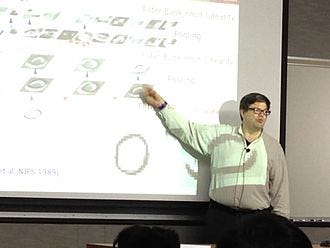Private Equity:
Don’t go chasing waterfalls,
Please stick to the rivers and the lakes you are used to
I know you’re gonna have it your way or no way at all
But I think you’re moving too fast.
In the brief video above, AI leader for Meta and More Yan LeCun calls bs on the “billions parameters” “AGI” “computer will think for us” bs.
He’s right and I’ve been saying this for some time.
AGI is Santa Claus.
As Yan shares, its NOT EVEN THE POINT! So what is the point?
Cogency of use. What AI is best is that AI which works best.
Forget “thinking level AI” we need more “thinking level AI users” and (a’hem) INVESTORS!
Think I mussed the audio CLICK HERE TO SEE THE 60 SECOND ON X
More info on YAN LE MAN!
More info on YAN LE MAN!
Vice President, Chief AI Scientist at Meta
Early life and education

LeCun was born on 8 July 1960, at Soisy-sous-Montmorency in the suburbs of Paris. His name, Le Cun, originates from the old Breton form Le Cunff, and was from the region of Guingamp in northern Brittany. "Yann" is the Breton form for "John".[2]
He received a Diplôme d'Ingénieur from the ESIEE Paris in 1983 and a Ph.D. in computer science from Université Pierre et Marie Curie (today Sorbonne University) in 1987 during which he proposed an early form of the back-propagation learning algorithm for neural networks.[14] Before joining AT&T,[15] LeCun was a postdoc for a year, starting in 1987, under Geoffrey Hinton at the University of Toronto.
Career
Bell Labs
In 1988, LeCun joined the Adaptive Systems Research Department at AT&T Bell Laboratories in Holmdel, New Jersey, United States, headed by Lawrence D. Jackel, where he developed a number of new machine learning methods, such as a biologically inspired model of image recognition called convolutional neural networks,[16] the "Optimal Brain Damage" regularisation methods,[17] and the Graph Transformer Networks method (similar to conditional random field), which he applied to handwriting recognition and OCR.[18] The bank check recognition system that he helped develop was widely deployed by NCR and other companies, reading over 10% of all the checks in the US in the late 1990s and early 2000s.[citation needed]
In 1996, he joined AT&T Labs-Research as head of the Image Processing Research Department, which was part of Lawrence Rabiner's Speech and Image Processing Research Lab, and worked primarily on the DjVu image compression technology,[19] used by many websites, notably the Internet Archive, to distribute scanned documents.[citation needed] His collaborators at AT&T include Léon Bottou and Vladimir Vapnik.
New York University
After a brief tenure as a Fellow of the NEC Research Institute (now NEC-Labs America) in Princeton, NJ, LeCun joined New York University (NYU) in 2003, where he is Jacob T. Schwartz Chaired Professor of Computer Science and Neural Science at the Courant Institute of Mathematical Sciences and the Center for Neural Science. He is also a professor at the Tandon School of Engineering.[20][21] At NYU, he has worked primarily on Energy-Based Models for supervised and unsupervised learning,[22] feature learning for object recognition in Computer Vision,[23] and mobile robotics.[24]
In 2012, he became the founding director of the NYU Center for Data Science.[25] On 9 December 2013, LeCun became the first director of Meta AI Research in New York City,[26][non-primary source needed][27] and stepped down from the NYU-CDS directorship in early 2014.
In 2013, he and Yoshua Bengio co-founded the International Conference on Learning Representations, which adopted a post-publication open review process he previously advocated on his website. He was the chair and organiser of the "Learning Workshop" held every year between 1986 and 2012 in Snowbird, Utah. He is a member of the Science Advisory Board of the Institute for Pure and Applied Mathematics[28] at UCLA. He is the Co-Director of the Learning in Machines and Brain research program (formerly Neural Computation & Adaptive Perception) of CIFAR.[29]
In 2016, he was the visiting professor of computer science on the "Chaire Annuelle Informatique et Sciences Numériques" at Collège de France in Paris, where he presented the "leçon inaugurale" (inaugural lecture).[30] In 2023, he was named as the inaugural Jacob T. Schwartz Chaired Professor in Computer Science at NYU's Courant Institute.[31] LeCun is also a scientific advisor to French research group Kyutai which is being funded by Xavier Niel, Rodolphe Saadé, Eric Schmidt, and others.[32]
Honours and awards
LeCun is a member of the US National Academy of Sciences,[33] National Academy of Engineering and the French Académie des Sciences.
He has received honorary doctorates from IPN in Mexico City[34] in 2016, from EPFL[35][36] in 2018, from Université Côte d'Azur in 2021,[37] from Università di Siena in 2023,[38] and from Hong Kong University of Science and Technology in 2023.
In 2014, he received the IEEE Neural Network Pioneer Award and in 2015, the PAMI Distinguished Researcher Award.[39]
In 2018, LeCun was awarded the IRI Medal, established by the Industrial Research Institute (IRI),[40] and the Harold Pender Award, given by the University of Pennsylvania,[41]
In 2019, he received the Golden Plate Award of the American Academy of Achievement.[42]
In March 2019, LeCun won the 2018 Turing Award, sharing it with Yoshua Bengio and Geoffrey Hinton.[43]
In 2022, he received the Princess of Asturias Award in the category "Scientific Research", along with Yoshua Bengio, Geoffrey Hinton and Demis Hassabis.[44]
In 2023, the President of France made him a Chevalier (Knight) of the French Legion of Honour.[45]
During the World Economic Forum (WEF) 2024 in Davos, he received the Global Swiss AI Award 2023.[46] In the same year, he received the grand prize of the VinFuture Prize alongside Yoshua Bengio, Jensen Huang, Geoffrey Hinton, and Fei-Fei Li for their groundbreaking contributions to neural networks and deep learning algorithms.[47]
In 2025 he was awarded the Queen Elizabeth Prize for Engineering jointly with Yoshua Bengio, Bill Dally, Geoffrey E. Hinton, John Hopfield, Jen-Hsun Huang and Fei-Fei Li.[48]
Some day will resurface my 2007 article, “Slow Tech, Why Novelty is not the Aim”













Share this post